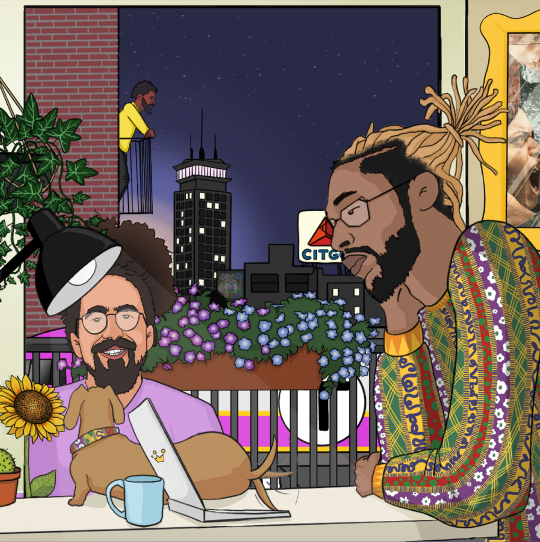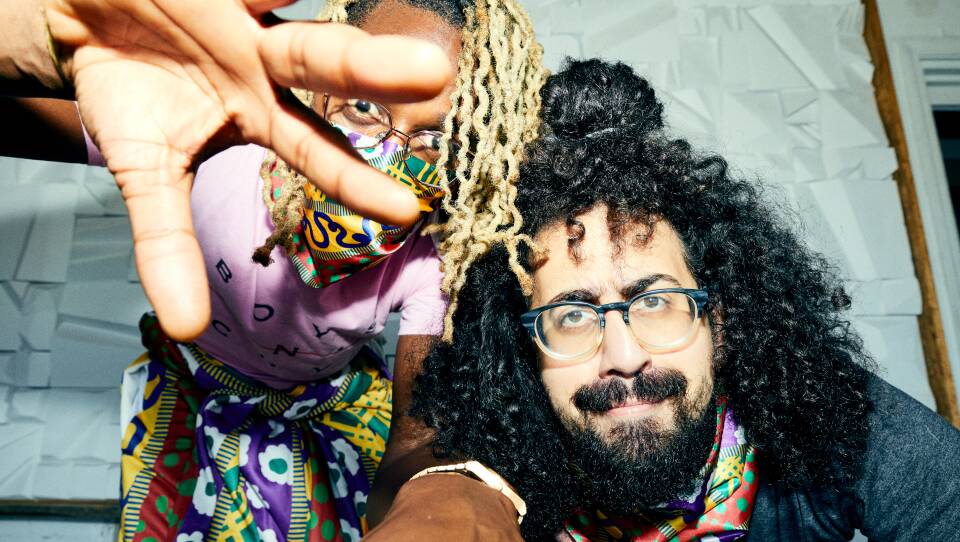Cliff Notez is many things, among them a musician and an advocate. Through his projects, including Boston Answering — a showcase that elevates the city's brimming talent as an alternative to Boston Calling — he lobbies for access and inclusion for the emerging and diverse voices within the local arts scene. Notez is proud of the creators in this city and wants the world to know who they are.
"I love my arts community; I love my Black Boston," he tells me. "I believe there's something special here that the world needs to see."
That affection helped forge his friendship with Dephrase (aka Daniel Babai.) The two met when Notez's artist's collective HipStory took up studio space in Cambridge. "Our studios were close to one another," Notez says, "We both admired each other's work and wanted to get on something together."
They collaborated on several projects, including Alec Huston's Reactions and Dephrase's other music project Optic Bloom. This month, they released their first EP.
Social Absence
Social Absence was created virtually, much of it shaped during the lockdown brought on by the pandemic. But its roots were planted years ago when Dephrase hooked up with another Boston-based musician, Latrell James ( who performed at WGBH in 2018 ), and created the beat that would later become the EP's single "Voodoo Doll." Making the album remotely was a lengthy process that included sending files back and forth until it came together. Dephrase notes that it's a cool example of what happens when artists become self-reliant on technology and can lay down ideas on their own. "With the 'quarantimes' that we're in," he says, "I think there will be many more stories like this in the near future."
I hope so, because when I listen to Social Absence, I hear a flawless blend of vibrant styles, much-needed perspective, and endless creativity — a real showpiece that speaks to the level of talent coursing through the music scene in Boston.
We spoke further about making the EP and its single "Voodoo Doll," featuring Latrell James, creating and supporting music in Boston, and what each of them have on repeat right now. Highlights from our conversation are below.
On making "Voodoo Doll":
Latrell James: I see this collaboration as a mosaic. I added some pieces, Dephrase added one piece, and so did Cliff.
Dephrase: I initially sent the beat to Latrell, and he came back to me really quickly with a verse, hook, and bridge. I felt like the track was special, and while Latrell's part absolutely floored me from the beginning, it didn't really feel done yet.
Cliff has always taken any challenge I've thrown at it him and turned it into something really cool, which is kind of how this and the rest of the EP came about.
Cliff Notez: This was one of the first beats he sent me. It was right before my MASS MoCA residency, and he gave me a nice mic and a cloud to record with. I worked on hundreds of projects there. I think he sensed I was hungry and kept feeding me, this being one of the first.
Dephrase: Latrell and Cliff are both amazing artists who are down to work with unique perspectives, and I really appreciate that about them both. Given how much energy comes out during the song, I hope listeners can take away some positivity in these relatively bleak times.

On the artwork for the EP:
Notez: Nick Martin is a beast. We've been friends since my freshman year of college, and this past February, we opened our first gallery show together at the Dorchester Art Project.
He started working on this art for the EP before we even knew it was for the EP. I thought I was going to put out a beat tape or something eventually, but from the inception to the point where it was becoming a real thing, and we needed artwork, it just clicked that this would make sense, so Nick did more work adding Dephrase and Latrell to the mix.
It's funny because my last single "Happy" also featured both of them, and we didn't plan for this to be the next project, it just happened that way. Boston works that way a lot of times - we're all a big-ass family.
On making music in, and breaking out of Boston:
Dephrase: Boston is so small and big at the same time. It feels like the hip-hop adjacent scenes are one big family, and it's so nice to be able to reach people and stay in touch easily after meeting.
Sadly, a lot of these connections happen at shows, which are currently... well, you know. I think we have to band together to keep making live streaming and internet connections feel as warm and personal as possible to maintain the connection with our collaborators and audiences.
James: I personally wouldn't change a thing. I just want more artists to keep showing each other the support and love we all need.
"The unique challenge for me, most recently, has been breaking out of Boston. We have so much talent here, but I don't think Boston has gotten the national respect it deserves."Cliff Notez
Notez: It's been great seeing people I love, like Brandie Blaze, Red Shaydez, Forté, Pink Navel, and so many more, get the local love they all truly deserve. But I believe our scene deserves way more than that - locally, nationally, and even globally. That's what I'm working towards.
On how the pandemic has affected their creativity:
Notez: I'm grateful to be a full-time artist. Although I got hit financially with the lack of shows, it forced me to live in my studio spaces and create, and that's what I've been doing.
When I'm not performing or teaching or doing some stuff for HipStory, I'm creating. The amount that I've been able to focus on building business plans and strategies is a luxury I haven't felt yet in my career. I'd be a fool not to take advantage.
Dephrase: I'm in kind of a unique situation as I co-own and am the head engineer at Ugly Duck Studios in Brighton. The initial quarantine allowed us to re-think the studio's layout for how it's used today, and make a lot of changes that make daily operation a lot smoother in general. Having such a busy schedule before the pandemic, I also realized I wasn't giving myself, my partner, or the people important to me enough time to grow and develop. Having the opportunity and time to dive back into relationships and learning/discovering more of my craft (which is why I got into music in the first place), and tending to my mental and physical health, helped me realize what's important, and how much I was spending time on things that weren't fulfilling before.
Latrell: One thing I didn't realize is that I rely on experiences from shows and people for inspiration. The lack of being able to be in the spaces have made me tap other sources to be inspired.
On the music they're listening to right now:
Notez: "Mercy, Mercy Me" by Marvin Gaye. I spent a lot of time with this record as a whole in different stages of my life. As a youngin' going through my dad's record collections, as a young adult in Milwaukee studying audio engineering at National Recording LLC. Then, most recently was reintroduced to it via Spike Lee's recent film "Da 5 Bloods." This specific song makes me cry when I sing with Marvin. He means so much to me on so many levels.
But it also brings me a sense of calm. Marvin's voice sings like a lullaby-like, "I'm here with you, I know the pain, you're not the only one feeling it." That's why I make music, to talk about my pain, the pain of my people, and hopefully, I can be a Marvin to someone else.
Dephrase: Anything by KAYTRANADA. I can't possibly feel down when I listen to his music, really uplifting in times like these.
James: Luke Bar$ "Die With Pride." Just reminds me to continue building my legacy - make my last name mean something.
Social Absence





